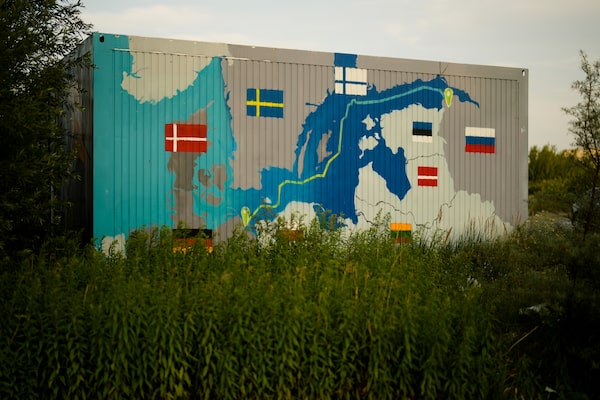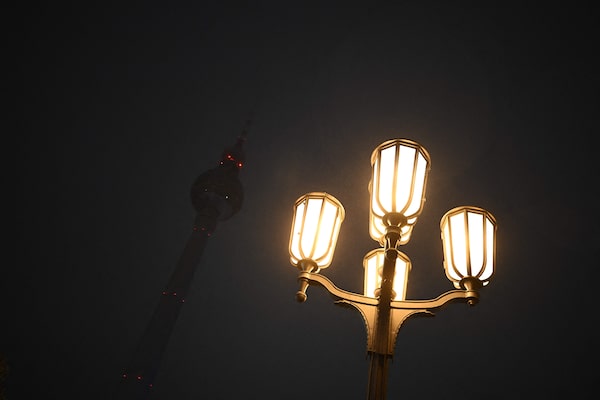:format(jpeg)/cloudfront-us-east-1.images.arcpublishing.com/tgam/DWTS37QX6RADBNMWAUWEP7P5OQ.jpg)
Jonathan Garfinkel is the author of the forthcoming novel In a Land Without Dogs the Cats Learn to Bark.
I know things are bad when I ask the Hausmeister Daniel, our superintendent, whether it’s possible to use the old coal-burning Kachelofen to heat my office.
“You just need to hire a chimney inspector,” he explains in German. “And get someone to reconnect the coal stove.” He even offers to help me find a coal supplier.
I nod in disbelief. When I bought my apartment in Berlin over a decade ago, there were two Kachelofen, neither in use. Most people told me to get rid of them. I compromised and kept one. There was something nostalgic about these outmoded heating monstrosities and the way they evoked a Berlin of the early 20th century. When I first visited Berlin in the nineties, and rents were 150 Deutsche marks a month, the Kachelofen were ubiquitous. I liked being reminded of a time when life was cheaper, when being an artist seemed a viable choice, before I contributed in my own modest way to Berlin’s gentrification (with its creamy-beige tile, my six-foot-tall oven resembles the backsplash of a third-wave coffee shop). Little did I know that a decade later, during Europe’s worst energy crisis since the seventies, I’d be considering using the damn thing.
The truth is, I’m not alone. Daniel the Hausmeister says many Germans are turning back to coal or wood-pellet heating; electricity companies have too. With natural gas prices skyrocketing because of the war between Russia and Ukraine, people are desperate.
I ask my friends Vivian and Benjamin for advice. Vivian chastises me for polluting the environment. Benjamin chastises me for potentially blackening my walls with smoke. I ask what they’re planning. Vivian’s solution? Waermflasche, hot water bottles. Benjamin? Cashmere sweaters and red wine from Italy, preferably Tuscany. I’m really not sure what to do.

Chimneysweep Norbert Skrobek explains to a Berlin homeowner how to operate the 19th-century tiled stove in his apartment. Mr. Skrobek says his services have been in high demand as Berliners try to heat their homes with coal and wood.Sean Gallup/Getty Images/Getty Images
It’s been a warm autumn (the warmest in Germany since 1881), and it’s all we talk about. One Sunday in late October, my best friend Holly and I are having a coffee by the Spree. We take off our jackets and marvel at the mildness. Holly raises his middle finger to the sky and says, “We should send this picture to Putin: a great big warm ‘eff you’!” We are as dependent on climate change as we are on energy prices to survive the winter ahead.
Holly is originally from Bremen. He moved to Berlin in 1984 in order to avoid conscription (before the Wall came down in 1989, West Germans could avoid mandatory military service by moving to this then-underpopulated Cold War island). Holly and I have known each other for over 20 years. We talk together, walk together, endured the pandemic together, and now, we deconstruct the war together. Holly has bleached blond hair, a couple of earrings, a Gen X punk gone soft with middle age.
When the war began last February, there was a collective shock in Berlin; we had just endured yet another winter of lockdowns. The Russian invasion evoked, in German friends of a particular generation, the trauma of a not-so-distant past. These were children and grandchildren of those who’d witnessed, participated and collaborated in the Second World War – Holly’s father had been in the Hitler Youth. The Ukraine war affected my German friends in ways that surprised me: a discomfort wrought with pacifism and bad ancestry. Europe hadn’t seen a ground war like this in decades and they never imagined seeing one in their lifetimes.
While I was less gun-shy, Holly was ambivalent on the matter of supplying Ukraine with weapons. “War,” he liked to say, “never leads to anything good.” He pointed to other helpful responses. As with the war in Syria, Germany opened its doors to Ukrainian refugees; hundreds of thousands of women arrived with children or parents in tow. After registration with local authorities and a quick application process, the German government granted refugees two- to three-year residency permits, social assistance and health insurance. Berliners flooded to the train stations to bring food and water to the newly arrived. Meanwhile, hundreds of thousands protested Vladimir Putin’s invasion, Holly and me included. Everyone agreed: We had to do something. Debates over how many sanctions, how much aid, and what kinds of weapons to be sent were endlessly argued over in bars and in parliament.

A map of the Nord Stream pipelines in Lubmin, Germany.Markus Schreiber/The Associated Press
Then, on Sept. 2, Mr. Putin turned off the Nord Stream 1, effectively ending the supply of Russian natural gas to Europe.
In the summer, with gas prices soaring as Europe tried to wean itself off Russian fossil fuels, Germany frantically purchased gas from Norway, the Netherlands, Qatar and the United States (pre-invasion, Germany obtained 55 per cent of its gas from Russia). By the time Mr. Putin cut off the lines, gas reserves were 80 per cent full. The fear of a winter without heat lessened; now the astronomical costs are front and centre. Rising prices have driven up inflation, forcing a number of mid-size and smaller businesses to close. As the third largest exporter in the world behind China and the United States, Germany’s economy is particularly vulnerable; stories of companies closing cram the daily newspapers. Germany is spiralling toward recession and perhaps a complete unravelling of its industry and way of life. As the cost of living skyrockets, the fear of ordinary Germans resenting involvement in the war persists. Recent protests in the former East Germany, some of which were led by the populist AfD, echo such concerns (not to mention a pro-Putin slant).
As Holly likes to say, “War never leads to anything good.”

Messages of peace light up the Brandenburg Gate in Berlin on Oct. 7, part of the yearly Festival of Lights. The event took place at only about half of the usual landmarks, to save power.JOHN MACDOUGALL/AFP via Getty Images
One night Holly and I are out for drinks at the local Kneipe. Conversation centres around the winter ahead. We dread it, like another season of COVID lockdowns. Holly stares at his whisky, his real-time solution to the energy crisis.
“We’ll wear more sweaters,” he suggests, nodding to the bartender for a refill.
The more we drink, the more we debate. Why, I ask, had Angela Merkel gone to bed with Mr. Putin so many years ago? What was one of the few reasonable leaders in Europe thinking when she decided to rely on a former KGB agent turned autocrat, who waxed sentimental over Stalin and dreamed of a greater Russia?
Holly, who has seen all manner of changes in Berlin in the past four decades, says, “It’s complicated.”
I ask him to explain.
First, background: “It was a different world 20 years ago when Germany started negotiating with Putin.” He explains that the construction of gas pipelines like the Nord Stream 1 and 2, designed to shuttle precious natural gas from Russia to German refineries at seductively low prices, was only part of the allure. There was an opportunity to form stronger ties to keep an autocrat like Mr. Putin at bay. “A kind of friendly capitalist payoff,” he concludes cynically.
So, there was logic to the thinking of Ms. Merkel, who until last week remained curiously silent on the matter since the invasion. Holly adds, “Whatever she thought of Putin, she believed Russians would, like East Germans in the eighties, be diehard capitalists who wanted nice fridges and vacations in Italy.” Holly swills his drink, considers some peanuts, then continues: “Merkel underestimated the fact Putin would allow this for only a certain part of the population. Perhaps she underestimated his agenda too.” We finish our drinks. As Holly stands up, he says, “Russia isn’t going away.”
“So?”
“They’re our neighbours. Some relationship is better than none. Nobody thought Putin would go this far.”

A street light shines next to the TV tower at Berlin's Alexander square on a November night.TOBIAS SCHWARZ/AFP via Getty Images
We leave the Kneipe and part ways. November in Berlin is dark, temperatures dropping. The conversation continues in my head: What about the invasion of Crimea in 2014? Georgia in 2008? Chechnya in 2000? Hasn’t the writing always been on the wall? Why – other than the Ukrainians and the CIA – did no one think Mr. Putin would go this far?
In the past weeks, concerns have mounted. But in a city where everything is debated and most everything political, Berlin may find its way out. In October, a €200-billion support package was unveiled by the local and federal governments (it drew criticism from other EU countries for a “Germany first” attitude in Berlin). Gas heating in December will be free for households and small to medium-sized businesses. In January, energy fees will be capped up to the first 70 per cent of the previous year’s usage (anything higher will be sold without the price break). This encourages people to use less heat at more affordable prices. Added to the newly subsidized public transportation and rail, you have the makings of a kinder, gentler winter, all footed by the government.
Questions remain. How will the government afford this? When Germans get higher energy bills, will they still want to support Ukraine? And what about next winter? Can Europe go green? Initiatives such as heavily subsidized rail travel, and increasing wind and solar energy systems, suggest that institutional will is finally here. But will it be enough? How quickly can countries like Germany change?
I write all of this knowing that in many parts of Kyiv, friends are without power or heat. There are no bombs over Berlin. Friends in non-NATO countries such as Georgia and Moldova worry they’re next, and with good reason. In the meantime, I’m waiting for the chimney inspector to decree my coal stove functional. I’ve got a lead on a coal supplier in Brandenburg. My eco-conscience doesn’t like this solution, but I tell myself it’s temporary. Along with the new measures – sweaters, red wine and Waermflasche – I’ll carry pails of heavy black rocks up four flights of stairs. The exercise ought to keep me warmer and fitter too. The anxiety is everywhere, the adjustments imminent, and nobody can read the future. But one thing is certain: As Russia challenges the world order, our daily lives need to change.

At his Berlin apartment, Mr. Garfinkel works by the coal stove.Hudson Hayden/The Globe and Mail